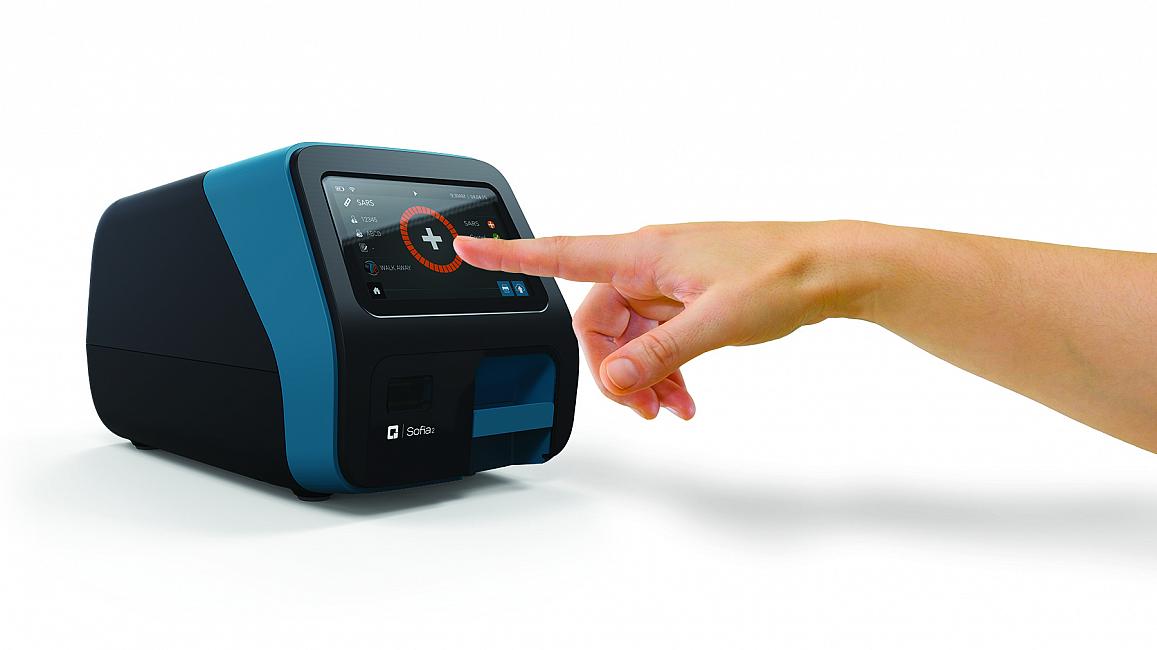The National Institutes of Health’s (NIH) Rapid Acceleration of Diagnostics (RADx) program has inked seven contracts, totaling nearly $250 million in combined funding, in its effort to expand COVID-19 testing capabilities. The RADx program was launched by NIH’s National Institute of Biomedical Imaging and Bioengineering in April, following Congress’ $500 million appropriation for testing and a “national COVID-19 testing challenge” announced by the NIH.
The program has received more than 650 project proposals and has so far narrowed its potential list of award recipients to 100 and, ultimately, seven awardees. Those proposals and their projects have now entered “Phase 2” funding, as the NIH aims to increase COVID-19 testing to approximately 6 million people per day.

Quidel’s Sofia 2 point-of-care instrument delivers test results for COVID-19 in 15 minutes. Courtesy of Quidel via NIH.
Hundreds of leading industry minds collaborate in the selection process, including those from NIBIB’s Point-of-Care Technology Research Network. The seven projects currently receiving Phase 2 development funding consist of both lab-based and point-of-care tests. They are:
Fluidigm (Lab-based, South San Francisco, Calif.)
Fluidigm’s BioMark HD microfluidics platform can process thousands of PCR tests daily, relying on saliva samples. Using existing Fluidigm instruments in clinical and research labs, scale-up and deployment of the company’s advanced integrated fluidic chips can provide tens to hundreds of thousands of new tests per day by fall 2020.
Ginkgo Bioworks (Lab-based, Boston)
Ginkgo Bioworks uses automation for handling samples, and high-throughput sequencing technologies to process tens of thousands of individual tests simultaneously. The company plans to work with universities, schools, public and private companies, and local communities to provide end-to-end sample collection and report results within or before 24 to 48 hours of sample receipt. It expects to scale up to 50,000 tests per day in September 2020 and 100,000 per day by the end of the year.

Helix OpCo (Lab-based, San Mateo, Calif.)
Helix will ship standardized kits in bulk for the collection of nasal swabs to public health departments, health care systems, employers, and other customers to collect samples that can be processed at once and within 24 to 48 hours, in high volumes, using a combination of automation processes and sequencing technologies. Helix is expected to process up to 50,000 samples a day by the end of September 2020 and 100,000 samples per day by the end of the year.
Mammoth Biosciences Inc. (Lab-based, South San Francisco, Calif.)
The Mammoth Biosciences SARS-CoV-2 DETECTR assay uses CRISPR technology. The high-throughput solution can result in a multifold increase in testing capacity in commercial laboratories.
Mesa Biotech (POC-based, San Diego)
The company’s Accula SARS-CoV-2 test employs a handheld RT-PCR device and a compact, single-use cartridge that detects viral RNA at the point of care. Analysts can read results from the removable cartridge in 30 minutes.
Quidel (POC-based, San Diego)
The Quidel Sofia SARS Antigen FIA test kit is a lateral flow immunoassay, designed for use with Sofia and Sofia 2 Analyzers in point-of-care settings. The analyzers give electronic results within 15 minutes.
Talis Biomedical (POC-based, Menlo Park, Calif.)
The Talis One COVID-19 point of care test is a multiplexed cartridge used with the compact Talis One instrument. The test detects through isothermal amplification of viral RNA and an optical detection system, returning a result in less than 30 minutes.
Nearly 40 project proposals have reached Phase 1 RADx development; the stage involves four to six weeks of initial technology review. More than 20 companies are still in development Phase 1 and eligible to advance. Additional proposals are still under review for funding, in either development Phase 1 or 2.